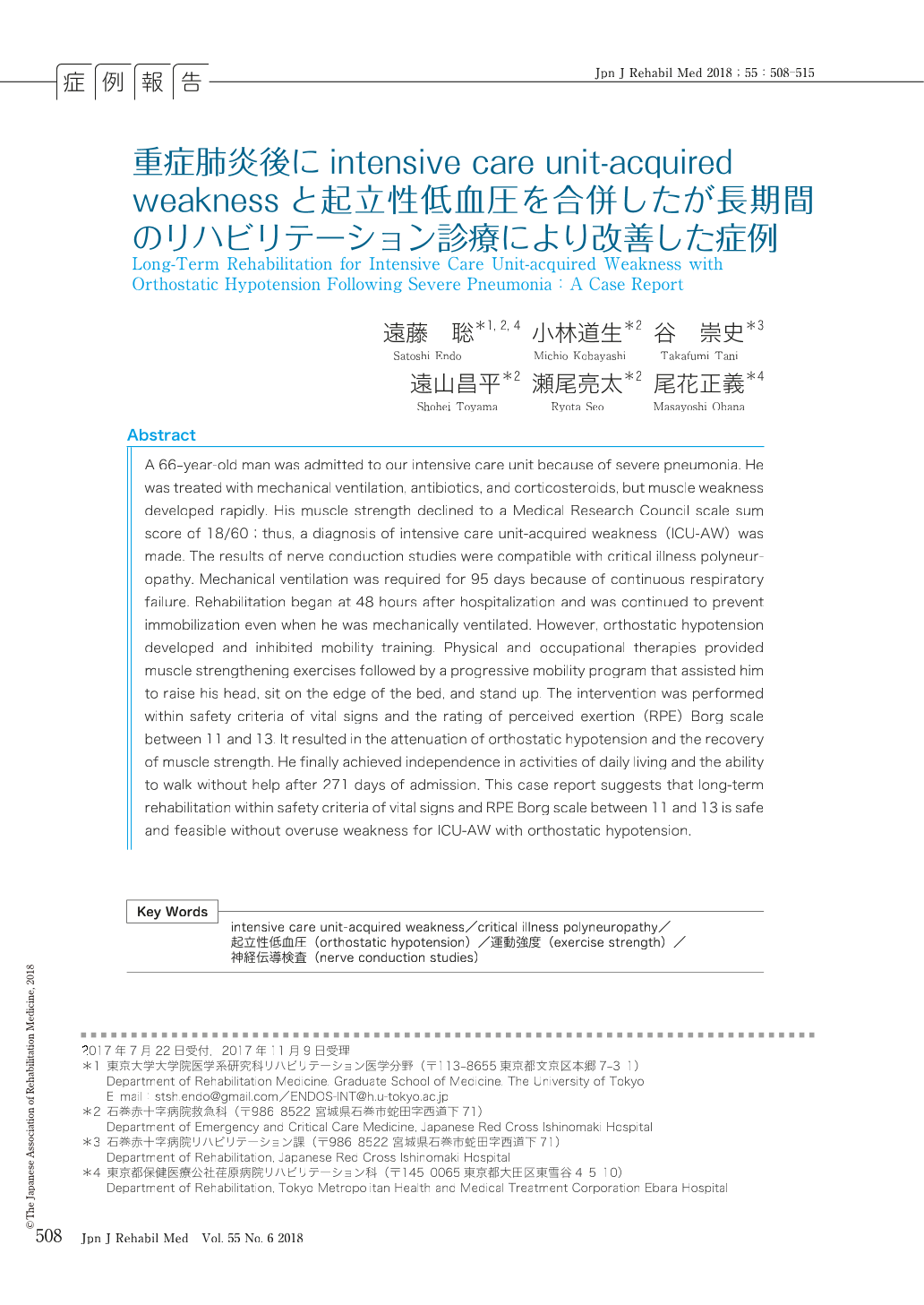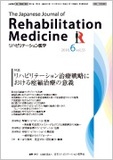Japanese
English
- 販売していません
- Abstract 文献概要
- 1ページ目 Look Inside
- 参考文献 Reference
はじめに
集中治療室(intensive care unit:ICU)管理を要する重症患者に,廃用では説明し難いびまん性四肢筋力低下を急速に合併することがあり,critical illness polyneuropathy(CIP)やcritical illness myopathy(CIM)として知られていた.近年,これらを総称してICU-acquired weakness(ICU-AW)と呼び,ICU患者に対して多職種で早期から長期にわたりかかわることが重要だと考えられるようになった1).ICU-AWを発症した場合,生命予後が短く,運動機能低下も遷延し,特に多臓器不全2)や筋力低下3)が重度であるほど,人工呼吸器管理期間が長いほど1)その傾向が強い.最近のコホート研究では,ICU-AW患者の50%が介助歩行可能になるまでに発症後81.5日間4),立ち上がりが自立するまでに発症後113日間5)必要だったと報告されている.ICU-AWではICUでの集中治療だけでなく,一般病棟転棟後や退院後の集中的なリハビリテーション治療も重要である.一般的にICU患者に早期からリハビリテーション治療を開始することの安全性や,その効果としてICU-AW発症予防や筋力回復促進の可能性が示され,その重要性が明らかとなってきている1)が,一般病棟転棟後や退院後の運動療法についてはまだ確立されていない.加えて,ICU-AW発症後に限ったリハビリテーション医学の研究は少なく,ICU-AW発症後に行うべきリハビリテーション診療についても明らかになっていない.今回,重症肺炎患者にICU-AWが生じ,さらに起立性低血圧も伴ったことでリハビリテーション治療実施に難渋したが,早期から長期間リハビリテーション治療を継続し,改善した症例を経験したので報告する.
A 66-year-old man was admitted to our intensive care unit because of severe pneumonia. He was treated with mechanical ventilation, antibiotics, and corticosteroids, but muscle weakness developed rapidly. His muscle strength declined to a Medical Research Council scale sum score of 18/60;thus, a diagnosis of intensive care unit-acquired weakness (ICU-AW) was made. The results of nerve conduction studies were compatible with critical illness polyneuropathy. Mechanical ventilation was required for 95 days because of continuous respiratory failure. Rehabilitation began at 48 hours after hospitalization and was continued to prevent immobilization even when he was mechanically ventilated. However, orthostatic hypotension developed and inhibited mobility training. Physical and occupational therapies provided muscle strengthening exercises followed by a progressive mobility program that assisted him to raise his head, sit on the edge of the bed, and stand up. The intervention was performed within safety criteria of vital signs and the rating of perceived exertion (RPE) Borg scale between 11 and 13. It resulted in the attenuation of orthostatic hypotension and the recovery of muscle strength. He finally achieved independence in activities of daily living and the ability to walk without help after 271 days of admission. This case report suggests that long-term rehabilitation within safety criteria of vital signs and RPE Borg scale between 11 and 13 is safe and feasible without overuse weakness for ICU-AW with orthostatic hypotension.

Copyright © 2018, The Japanese Association of Rehabilitation Medicine. All rights reserved.


